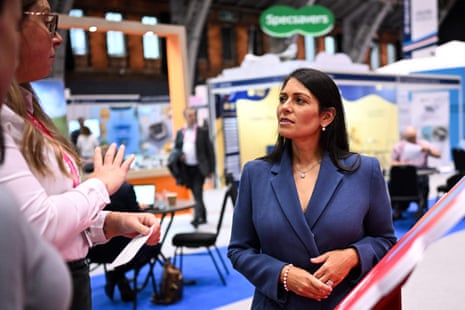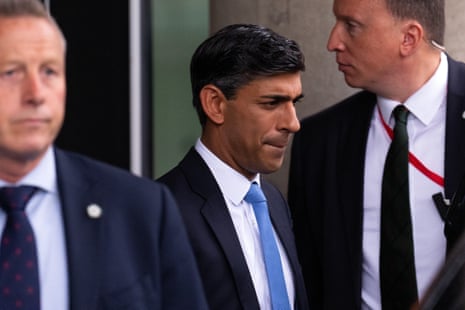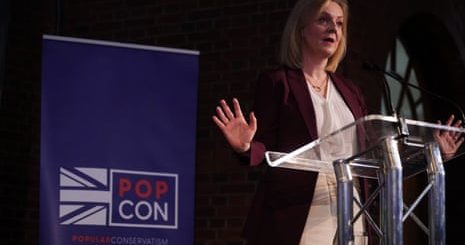Rishi Sunak claims putting reducing inflation ahead of tax cuts Thatcherite and ‘deeply Conservative’ – UK politics live | Politics
Sunak claims putting reducing inflation ahead of tax cuts Thatcherite and ‘deeply Conservative’
And here is a summary of the main lines from Rishi Sunak’s interview this morning.
-
Sunak refused to commit to tax cuts before the general election, after Michael Gove, the levelling up secretary, called for them. (See 10.27am.)
-
He claimed that focusing on bringing down inflation, ahead of cutting tax, was a “deeply Conservative approach”. It was “what Margaret Thatcher did, this is what Nigel Lawson did”, he said. He went on:
This is in the tradition of great Conservative governments, bringing inflation down, because that’s the bedrock on which you build a strong economy. And that is the best way to help people with the cost of living.
-
Sunak rejected claims that the uncertainty over the future of HS2, and whether the Birmingham to Manchester line will be built, was making Britain a laughing stock. When that was put to him, he replied:
I completely reject that. I speak to business leaders all the time … We’re attracting billions of pounds of investment into this country.
But he refused, again, to say whether or not the phase 2 extension to Manchester would go ahead. (See 9.17am.)
-
He brushed aside polling showing that being rich is the trait for which he is best known. When he was shown a word cloud illustrating this (see 9.40am), and asked what he thought about it, he just said: “My job is to deliver for people.”
-
He said that the government would not be stopping councils in England from introducing any new 20mph speed limits. Instead, the government would introduce new guidelines to ensure they are only implemented with community consent, he said. He explained:
What this is about is making sure that the statutory guidance that goes to local councils from government is clear about making sure that councils – which are obviously in charge of what’s happening in their local areas – are doing things with the support and consent of their local communities, taking into account the needs of their communities, and not imposing things on them without their consent and say so.
What they (councils) should be allowed to do in all cases is act in accordance with the government guidance.
-
He claimed that the government remained on track to meet its net zero targets despite the changes he announced watering down some net zero policies. Environmentalists say he has no evidence for this, and that the UK isn’t on track to meet its targets. (See 11.14am.)
-
He brushed aside criticism of the party from Richard Walker, the executive chairman of Iceland supermarkets, saying Walker “was trying to stand as a Conservative candidate” (implying he might have a grievance).
-
He suggested that Keir Starmer had not given a clear idea of what he stood for. Asked if there was anything he admired about Starmer, he did not say anything positive, but just talked about himself, saying “people will have a clear idea of what I believe, what I stand for” – implying that is not true of Starmer. (It was a slightly gauche answer, because people always like to hear politicians be nice about their opponents. For example, it wouldn’t have been hard to say Starmer is good at football, or that he’s a good dad.)
Key events
Conservative MPs need a majority of almost five figures to be safe at the next election, the American pollster and political stratest Frank Luntz told Times Radio. “I think there are going to be some MPs that are going to be shocked on election day because the vote against them could be so high,” he said. He explained:
I would say that if your majority is less than 8000, you might want to look for another job.
Helena Horton
Eco-energy tycoon Dale Vince was attacked by Tory ministers and members of the rightwing press when it was revealed that he funds both the Labour party and Just Stop Oil.
Since then, he has become much more publicly politically active, and has today been trying to disrupt the Conservative conference by paying for a giant LED screen opposite the Midland Grand hotel, which Rishi Sunak is sure to see on his travels around the Conservative conference.
On it, there is a film playing which accuses the Tories of squandering the last decade, not acting to decarbonise energy and stop spewing fossil fuels, and campaigning for young people to vote for a different party.
Vince has been standing outside in the drizzle hoping to catch Sunak and tell him that his plans to water down net zero policies are an “assault on common sense”. He said:
If you are alive today, the next election will be the most important of your lifetime. By the time this election comes we will have wasted the first half of the vital last decade the UN said we had within which to act – to avoid the worst of the climate crisis.
Nearly 3 million first-time voters face unprecedented obstacles between them and simply voting, deliberately placed in their way by this Conservative government. The voices of young people speak clearly in this film, their voices need to be heard at the ballot box too.

Sunak says British troops could at some point in future go to Ukraine to provide training – but not to fight
Grant Shapps, the new defence secretary, told the Sunday Telegraph that at some point the training for Ukrainian troops provided by the Ministry of Defence could take place in Ukraine. The paper splashed the story under the headline: “Shapps to send UK troops to Ukraine.”
On a visit to Burnley this morning, Rishi Sunak said he wanted to clarify the situation given there had been “some misreporting”.
He said that Britain has been training Ukrainian citizens and soldiers “for a long time” within the UK. He went on:
And what the defence secretary was saying was that it might well be possible one day in the future for us to do some of that training in Ukraine.
But that’s something for the long term, not the here and now, there are no British soldiers that will be sent to fight in the current conflict. That’s not what’s happening. What we are doing is training Ukrainians. We’re doing that here in the UK.

Rishi Sunak is doing a Q&A with party members this afternoon. But, as the Sun’s Harry Cole reports, journalists won’t be allowed to watch.
JUST IN: Sunak’s question and answer session with Tory members this afternoon will be behind closed doors in the main conference hall. Comments at the top will be broadcast but no Press…
JUST IN: Sunak’s question and answer session with Tory members this afternoon will be behind closed doors in the main conference hall. Comments at the top will be broadcast but no Press… 🤔🤨
— Harry Cole (@MrHarryCole) October 1, 2023
Patel defends multiculturalism and suggests Braverman was attention-seeking with hardline immigration speech
Priti Patel, the former home secretary, has accused her successor, Suella Braverman, of attention-seeking with her immigration speech in Washington last week.
Asked what she thought of the speech during an interview on Sunday Morning with Trevor Phillips, on Sky News, Patel replied:
I don’t know what the intention was around that – it might just be get attention, to have the dividing lines that previous commentators were mentioning as we go into the run-up to a general election.
Patel also refused to endorse Braverman’s claim in the speech that multiculturalism had failed. Asked about this aspect of the speech, Patel suggested Braverman had failed to provide “some perspective and context” around the situation in Britain.
She told Phillips:
You and I are sitting here today, we are the products of actual integration, multiculturalism, dynamic communities, people who love our country, want to contribute to our country, along with a hell of a lot of other people that have done exactly the same.
I think that is something we should be proud of in our country.

Sunak claims putting reducing inflation ahead of tax cuts Thatcherite and ‘deeply Conservative’
And here is a summary of the main lines from Rishi Sunak’s interview this morning.
-
Sunak refused to commit to tax cuts before the general election, after Michael Gove, the levelling up secretary, called for them. (See 10.27am.)
-
He claimed that focusing on bringing down inflation, ahead of cutting tax, was a “deeply Conservative approach”. It was “what Margaret Thatcher did, this is what Nigel Lawson did”, he said. He went on:
This is in the tradition of great Conservative governments, bringing inflation down, because that’s the bedrock on which you build a strong economy. And that is the best way to help people with the cost of living.
-
Sunak rejected claims that the uncertainty over the future of HS2, and whether the Birmingham to Manchester line will be built, was making Britain a laughing stock. When that was put to him, he replied:
I completely reject that. I speak to business leaders all the time … We’re attracting billions of pounds of investment into this country.
But he refused, again, to say whether or not the phase 2 extension to Manchester would go ahead. (See 9.17am.)
-
He brushed aside polling showing that being rich is the trait for which he is best known. When he was shown a word cloud illustrating this (see 9.40am), and asked what he thought about it, he just said: “My job is to deliver for people.”
-
He said that the government would not be stopping councils in England from introducing any new 20mph speed limits. Instead, the government would introduce new guidelines to ensure they are only implemented with community consent, he said. He explained:
What this is about is making sure that the statutory guidance that goes to local councils from government is clear about making sure that councils – which are obviously in charge of what’s happening in their local areas – are doing things with the support and consent of their local communities, taking into account the needs of their communities, and not imposing things on them without their consent and say so.
What they (councils) should be allowed to do in all cases is act in accordance with the government guidance.
-
He claimed that the government remained on track to meet its net zero targets despite the changes he announced watering down some net zero policies. Environmentalists say he has no evidence for this, and that the UK isn’t on track to meet its targets. (See 11.14am.)
-
He brushed aside criticism of the party from Richard Walker, the executive chairman of Iceland supermarkets, saying Walker “was trying to stand as a Conservative candidate” (implying he might have a grievance).
-
He suggested that Keir Starmer had not given a clear idea of what he stood for. Asked if there was anything he admired about Starmer, he did not say anything positive, but just talked about himself, saying “people will have a clear idea of what I believe, what I stand for” – implying that is not true of Starmer. (It was a slightly gauche answer, because people always like to hear politicians be nice about their opponents. For example, it wouldn’t have been hard to say Starmer is good at football, or that he’s a good dad.)


Peter Walker
The security for getting people into the Conservative conference this year is stricter than ever – and appears to be based almost entirely around the worry that protesters might disrupt the event.
For the first time, no liquids at all are allowed to be taken into the venue, the Manchester Central conference centre, presumably to guard against substances being sprayed or poured.
While I was going through the security scanner system at the venue entrance, the man in front of me was stopped after they detected three tiny padlocks in his bag. They were all extracted and taken off “for inspection”, something an official said was due to concerns about protesters.
These padlocks were all tiny, the sorts of things people use to secure suitcases, or attach security cables to laptops. You would struggle to get one around the little finger of a cabinet minister if you wanted to attach yourself to them.
But in the era of Just Stop Oil – and watered down net zero policies – it seems caution is paramount.

In his interview this morning Rishi Sunak repeated his claim that there is a “war on motorists” under way, waged via policies such as 20mph speed limits and Ulez (the ultra-low emissions zone).
That phrase prompted this response on X (formerly Twitter) from Andrew Fisher, who was head of policy for Jeremy Corbyn when he was Labour leader. He says, cost-wise, drivers haven’t done badly.
And my colleague Peter Walker argues out, in a thread, that Sunak’s plan for motorists may not actually help them very much. It starts here.
Brief, slightly nerdy mini-thread on Sunak’s BBC interview, where he talked about the ‘plan for motorists’. Sunak said he acted because ‘people wanted to stop making life easy for people to use their cars’.
Well, yes – because (to an extent) that’s been policy for years.
Brief, slightly nerdy mini-thread on Sunak’s BBC interview, where he talked about the ‘plan for motorists’. Sunak said he acted because “people wanted to stop making life easy for people to use their cars”.
Well, yes – because (to an extent) that’s been policy for years.
1/
— Peter Walker (@peterwalker99) October 1, 2023
To point out the obvious, restrictions on driving are not a zero-sum game, even for drivers. If you endlessly build just infrastructure for cars, everyone drives, and you end up with horrendous congestion. There’s an incentive *just based on traffic* to provide alternatives.
To point out the obvious, restrictions on driving are not a zero-sum game, even for drivers. If you endlessly build just infrastructure for cars, everyone drives, and you end up with horrendous congestion. There’s an incentive *just based on traffic* to provide alternatives.
2/
— Peter Walker (@peterwalker99) October 1, 2023
Welsh government says it’s ‘profoundly disappointing’ Sunak wrongly saying Wales has ‘blanket’ 20mph speeding law
In his interview this Rishi Sunak claimed that the Labour government in Wales had introduced a “blanket” 20mph speed limit in residential areas.
Talking about the new government plan to limit the ability of councils on England to impose 20mph speed limits, Sunak said:
Cars for most people are the form of transport that they rely on the most. It’s the freedom that that gives you, it’s the ability to just get around and do your day to day life. And for too many people it felt like everyone was trying to stop them doing that, imposing on them blanket speed restrictions. That’s what we’ve seen in Wales from the Labour government there, a blanket 20mph speed limit.
Laura Kuenssberg said that in fact the Welsh system is very similar to the restrictions being introduced by the Conservative-run Cornwall council.
And the Welsh government issued a statement after the programme saying that Sunak was wrong to describe the policy in Wales as a blanket ban on doing more than 20mph in residential areas. A Welsh government spokesperson said:
It is profoundly disappointing the prime minister is inadvertently or intentionally, choosing to mislead people about the introduction of 20mph.
It is not a blanket restriction. Speed limits on a great number of roads in Wales are unchanged and journey times take around a minute longer. This will save lives and make our communities safer.

Green MP Caroline Lucas accuses Sunak of telling ‘dangerous lies’ about net zero policy in BBC interview
The Green party MP Caroline Lucas has accused Rishi Sunak of telling “dangerous lies” about net zero in his interview with Laura Kuenssberg this morning.
Clearly stung by “inaction man” jibe, Sunak turns into “arrogant & patronising bullying man” on #bbclaurak – telling deeply dangerous lies about #NetZero, sacrificing our future in a desperate attempt to secure his own survival
Clearly stung by “inaction man” jibe, Sunak turns into “arrogant & patronising bullying man” on #bbclaurak – telling deeply dangerous lies about #NetZero, sacrificing our future in a desperate attempt to secure his own survival
— Caroline Lucas (@CarolineLucas) October 1, 2023
Lucas seemed to be referring to Sunak claiming that the UK remains on track to meet its net zero targets despite the recent changes announced that water down some of the policies that were in place to ensure these targets were hit. (See 9.57am.)
When Kuenssberg put it to him that he was slowing down progress to net zero for political reasons, Sunak replied:
Absolutely not, because I’m focused on doing what I believe is right for the country in the long term.
Here are the facts. We’ve already decarbonised faster than any other major G7 economy. That’s a fact. We all have a set of targets for how much we’re going to decarbonise by 2030. Again, who’s the best? We are – down 68%.
We are going to meet these targets.
Kuenssberg said the Climate Change Committee said, after Sunak announced his policy changes, that the UK was not on track to meet its targets.
But Sunak said he did not accept that.
We are not off track. All these other countries are behind us. We’re ahead of them. We will continue being ahead of them. We have an obligation to meet these targets, we will meet them, that’s what all our analysis says. But we can do so in a more proportionate, pragmatic way.
Sunak’s interview with Laura Kuenssberg – snap verdict
Sometimes the PM’s big pre-conference Sunday TV interview is notable because they use it to announce a new policy. We did not get that from Rishi Sunak, but instead we did get a new personality – or, at least an attempt to delineate one. Sunak was more forthright and combative today (tetchy would be a less charitable description), and he sought to make a virtue of the fact that he would be setting out what he stood for. This is what he said as he wrapped up.
I’m interested in setting out my vision for the country, and people can make their own judgement.
What I would say is, you’ve got to take a stand on things. I don’t expect everyone to agree with me on everything, but people will have a clear idea of what I believe, what I stand for, and the direction in which I want to lead the country. I don’t think actually saying nothing, hiding, is the right type of leadership. I think that’s an abdication of leadership.
This fits with the plan evolved by Tory strategists to present Sunak as the change candidate at the election, while claiming it is Labour that stands for continuity. (It’s not the easiest message to sell, but Michael Gove, who seems to enjoy the intellectual challenge of arguing the impossible, gave it a go this morning. See 8.39am.)
One obvious problem with what Sunak was saying was that, when asked about one of the most pressing issues of the day, HS2, he refused point-blank to say what he believes, and what he stands for. (See 9.17am.)
Another problem is that, when he did take a stand, and refuse to commit to tax cuts before the general election (see 10.27am), he was not giving the answer that many of his MPs, and the papers that support the Conservative party, want to hear.
For many people at the conference, the most memorable takeway from the interview, though, won’t be anything Sunak said, but the word cloud showing how he is seen by voters.
Yesterday, in a feature in the Daily Telegraph on what the Tories need to do to avoid electoral oblivion, Gordon Rayner quoted a “party source” saying their best hope was to make the next election a choice between Sunak and Keir Starmer. The source told Rayner:
All of the polling consistently shows that the only way to win this is to make it all about the two leaders. If it’s Rishi versus Keir, Rishi wins. But if it’s Rishi versus Labour, or Tory versus Labour, or Keir versus Tories, Labour wins on all of those.
In fact, the polling does not say that – most polls now show Starmer ahead of Sunak on most metrics – and this word cloud does not look like the profile of an election winner.

Sunak refuses to commit to tax cuts after Gove says they should happen before election
This is what Rishi Sunak said in his interview with the BBC’s Laura Kuenssberg when he was asked if was willing to commit to tax cuts before the next election, as Michael Gove was calling for on Sky News. (See 9.44am.)
Sunak replied:
As I said, the best tax cut that we can give working people is to halve inflation.
When it was put to him that that was a no, he replied:
I’m a Conservative. I want to cut taxes.
You asked me about making changes. Change may be difficult, but I believe the country wants change and I’m going to do things differently to bring about that change.
And you saw that last summer. When it came to this question, I said the most important priority was to bring inflation down. It’s inflation that’s putting the price of things up, it’s inflation that’s making people feel poorer, the quicker we bring inflation down, the better it is. And we are making good progress.

Rishi Sunak said this morning in his BBC interview that the UK remains on track to meet its net zero targets, despite some of the policies that were in place to achieve them being watered down.
But ITV’s Anushka Asthana says the government has not provided any evidence to back this up.
What analysis for Rishi Sunak have that shows we are on track to meet our climate targets in the 2030s? If it exists surely govt should publish? Because all the public analysis suggests his policies from March 2023 and then this summer have knocked us off meeting 2033-37 targets.
What analysis for Rishi Sunak have that shows we are on track to meet our climate targets in the 2030s? If it exists surely govt should publish? Because all the public analysis suggests his policies from March 2023 and then this summer have knocked us off meeting 2033-37 targets.
— Anushka Asthana (@AnushkaAsthana) October 1, 2023
And Tone Langengen, a net zero specialist at the Institute for Government thinktank, says Sunak was wrong when he said the modelling implied the UK is on track to meet its targets.
Agree or disagree with the govt position on net zero, but it is plainly wrong of PM to say that “all modelling suggests we will meet our targets regardless”
The truth is that we are off track to deliver on our targets and do not have the practical plans in place to change this.
Agree or disagree with the govt position on net zero, but it is plainly wrong of PM to say that “all modelling suggests we will meet our targets regardless”
The truth is that we are off track to deliver on our targets and do not have the practical plans in place to change this. pic.twitter.com/YQZh9abW7l
— Tone Langengen (@ToneLangengen) October 1, 2023


